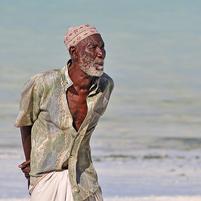As if we needed it, the damage inflicted by Cyclone Idai on three countries across southern Africa is yet another reminder of the increasing vulnerability of whole populations to the impacts of climate change. The cyclone has triggered what the UN has called a "massive disaster", with widespread flooding and devastation affecting Mozambique, Zimbabwe and Malawi. As the floodwaters have subsided, the extent of the devastation is becoming clearer, with hundreds of thousands displaced, and the immediate hazard of disease in the makeshift camps that have been established. At this point, about three weeks after the disaster, humanitarian agencies are still working on the immediate response, but the focus will soon shift to the huge challenges of rehabilitation and reconstruction.
In natural disasters like this, and in conflict-related emergencies, older women and men are frequently among the most marginalised. Studies of older people's health requirements after disasters, including the South East Asian Tsunami (2004), and in Kashmir, Pakistan, China, and the United States have all revealed a lack of concern for older people's health needs. A number of factors are implicated. When large numbers of people migrate because of conflict and disasters, the focus of host communities, governments and humanitarian agencies tends to be on the family or household groups of which older people form a part.
Priority is often given to children; older women and men, together with others who may be vulnerable, such as those with disabilities, are typically marginalised. HelpAge International’s Rapid Needs Assessments (RNAs), standardised surveys to gather basic data on affected communities after disasters, regularly report findings such as those from an RNA after Typhoon Mangkhut struck the Philippines in 2018. This RNA found that over 90% of older people reported that they had not been consulted by any humanitarian agency about relief service provision. Rights to essential services, such as accessing food, clean water and sanitation and healthcare, had not been upheld.
This exclusion seems to have a relationship not only with age, but also physical and mental capacity. For example, a 2018 report, Missing millions: how older people with disabilities are excluded from humanitarian response has emphasised that the attitudes of healthcare staff and humanitarian actors may be a significant barrier to the ability of older people with disabilities to access healthcare and social assistance. Older people have been turned away and told they cannot be helped because of their age, or are forced to stand in long queues in extreme temperatures to wait for aid.
However, the neglect of older people in the aftermath of humanitarian disasters is not simply due to attitudes among field personnel. The failure to ensure that global humanitarian policies are put into practice is also problematic. Thus, while international humanitarian standards and guidelines (such as the Sphere Handbook) emphasise the principle of collecting age disaggregated data, in practice needs assessment and surveillance surveys simply combine data for all adults. Initiatives such as the inclusion of older people in the Global Compact on Refugees are important steps to ensuring that older people are considered in displacement, but changes are still needed in the knowledge, understanding and attitudes of a wide range of actors if the situation for older people is to improve.
A recent study by HelpAge International suggests that when older people lose control of community resources and assets through displacement, their role and respect within the community is diminished. Community attitudes towards them change, and the problem may be exacerbated by the attitudes of humanitarian actors in emergencies. So, for example, humanitarian agencies frequently set out to empower groups of younger people as the focus of new community governance structures set up as part of humanitarian responses. This approach has the effect of excluding older people from access to information and community-level social protection initiatives. It also means that older people are rarely asked for their input into agencies' response plans and activities or given the opportunity to participate with their communities.
It is not surprising that these changes in community status, with the associated shift in attitudes of older people's families and communities towards them, have a negative impact on older people's mental health. Displacement, combined with a lack of autonomy and respect, can lead to depression, as older people feel may feel marginalised and isolated. This issue is not only one of mental health, but more broadly one of human rights and of structural ageism. Issues such as a lack of security in camps, may lead to marginalisation, poverty, and the abuse and neglect of older people. A recent Rapid Needs Assessment from South Sudan reported that approximately 25% of older people felt incapable of coping with their current situation, reflecting the pressing need for psychosocial support alongside provision of food, shelter, health and sanitation facilities.
The impact of natural disasters and civil emergencies on older people remains under-researched, and much of the evidence is still anecdotal. Older people are often grouped together with other “vulnerable” categories, including the very young, the poor, those with disabilities and the socially isolated. This is particularly the case for events occurring in low-income countries, where the evidence base on which to draw for a more nuanced approach is fragmentary. A number of ways forward are possible, and the formation of a United Nations “City” group to support the collection and analysis of improved data on ageing and later life in low- and middle-income countries is a significant step forward. Developments such as these will be essential to ensure that policy is translated into practice, challenging prejudice and changing the way people think and act towards older women and men in disaster and emergency responses.
About the Author
Mark Gorman is a Visiting Fellow at the Oxford Institute of Population Ageing. He is the Director of Strategic Development at HelpAge International.
Comments Welcome
We welcome your comments on this or any of the Institute's blog posts. Please feel free to email comments to be posted on your behalf to administrator@ageing.ox.ac.uk or use the Disqus facility linked below.
Opinions of the blogger is their own and not endorsed by the Institute
Comments Welcome: We welcome your comments on this or any of the Institute's blog posts. Please feel free to email comments to be posted on your behalf to administrator@ageing.ox.ac.uk or use the Disqus facility linked below.













